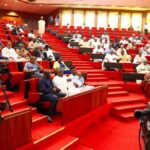Vice President Kashim Shettima has condemned the industrial action carried out by the Petroleum and Natural Gas Senior Staff Association of Nigeria (PENGASSAN), describing it as an attempt to hold Nigerians to ransom over a dispute with the Dangote Refinery.
Shettima made the remark while delivering a keynote address at the ongoing 31st Nigerian Economic Summit in Abuja on Monday.
Representing President Bola Ahmed Tinubu at the summit, the Vice President warned against actions capable of derailing the nation’s economic recovery and industrial progress.
He emphasized the need to protect strategic national investments such as the Dangote Refinery, which he described as “an institution, not an individual.”
On the recurring labour disputes and industrial unrest in the oil and gas sector, Shettima urged stakeholders to embrace dialogue and mutual understanding in the interest of national stability and development.
Delivering President Tinubu’s message at the summit, themed “Building a Prosperous and Inclusive Nigeria by 2030,” Shettima stated that the administration’s bold economic reforms are already yielding tangible results across critical sectors.
He disclosed that Nigeria’s external reserves have risen to $43 billion as of September, while total revenue collection increased from ₦19.9 trillion in 2023 to ₦27.8 trillion by August 2025.
Highlighting efforts in job creation and productivity, Shettima announced a $200 billion intervention fund to support micro, small, and medium enterprises (MSMEs), alongside major investments in agriculture, solid minerals, and infrastructure.
According to him, over 440 road projects covering 2,700 kilometres are currently under construction nationwide, while the Renewed Hope Work-Based Development Programme has been launched to empower communities across all 774 local government areas..If You’re Reading From Phoenix Click On Read Original at the top To Read Full Article
The Vice President also urged state governments to align their policies with the Renewed Hope Agenda, stressing that diversification, innovation, and inclusivity remain key drivers of Nigeria’s long-term economic growth.





